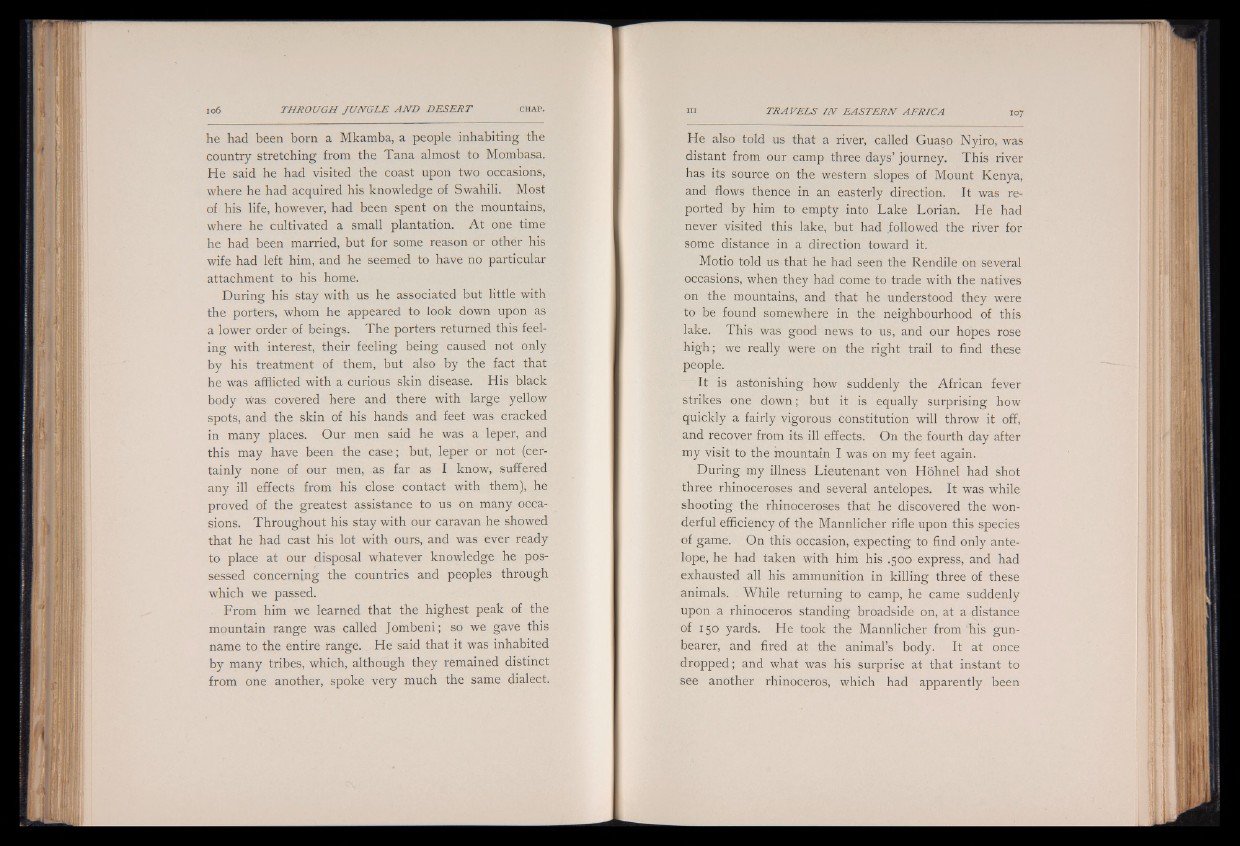
he had been born a Mkamba, a people inhabiting the
country stretching from the Tana almost to Mombasa.
He said he had visited the coast upon two occasions,
where he had acquired his knowledge of Swahili. Most
of his life, however, had been spent on the mountains,
where he cultivated a small plantation. A t one time
he had been married, but for some reason or other his
wife had left him, and he seemed to have no particular
attachment to his home.
During his stay with us he associated but little with
the porters, whom he appeared to look down upon as
a lower order of beings. The porters returned this feeling
with interest, their feeling being caused not only
by his treatment of them, but also by the fact that
he was afflicted with a curious skin disease. His black
body was covered here and there with large yellow
spots, and the skin of his hands and feet was cracked
in many places. Our men said he was a leper, and
this may have been the case; but, leper or not (certainly
none of our men, as far as I know, suffered
any ill effects from his close contact with them), he
proved of the greatest assistance to us on many occasions.
Throughout his stay with our caravan he showed
that he had cast his lot with ours, and was ever ready
to place at our disposal whatever knowledge he possessed
concerning the countries and peoples through
which we passed.
From him we learned that the highest peak of the
mountain range was called Jombeni; so we gave this
name to the entire range. He said that it was inhabited
by many tribes, which, although they remained distinct
from one another, spoke very much the same dialect.
He also told us that a river, called Guaso Nyiro, was
distant from our camp three days’ journey. This river
has its source on the western slopes of Mount Kenya,
and flows thence in an easterly direction. It was reported
by him to empty into Lake Lorian. He had
never visited this lake, but had followed the river for
some distance in a direction toward it.
Motio told us that he had seen the Rendile on several
occasions, when they had come to trade with the natives
on the mountains, and that he understood they were
to be found somewhere in the neighbourhood of this
lake. This was good news to us, and our hopes rose
high; we really were on the right trail to find these
people.
It is astonishing how suddenly the African fever
strikes one down; but it is equally surprising how
quickly a fairly vigorous constitution will throw it off,
and recover from its ill effects. On the fourth day after
my visit to the mountain I was on my feet again.
During my illness Lieutenant von Hohnel had shot
three rhinoceroses and several antelopes. It was while
shooting the rhinoceroses that he discovered the wonderful
efficiency of the Mannlicher rifle upon this species
of game. On this occasion, expecting to find only antelope,
he had taken with him his .500 express, and had
exhausted all his ammunition in killing three of these
animals. While returning to camp, he came suddenly
upon a rhinoceros standing broadside on, at a distance
of 150 yards. He took the Mannlicher from his gun-
bearer, and fired at the animal’s body. It at once
dropped; and what was his surprise at that instant to
see another rhinoceros, which had apparently been